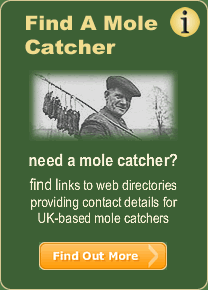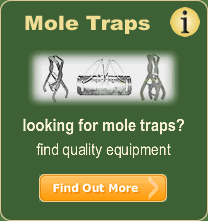Code of Aims, Ethics & Practice
1. THE ASSOCIATION OF PROFESSIONAL MOLE CATCHERS
1.1 The Association of Professional Mole Catchers (APMC) exists to bring competent, professional practice to the world of mole catching, and has the following aims:
a) To safeguard and promote occupational mole catching as a responsible, appropriate and sustainable profession.
b) To encourage excellence and appropriate working and business practices for mole catchers.
c) To secure and safeguard the availability of specialist equipment.
d) To support the principles of education, training, and professional development.
e) To foster public awareness & understanding.
f) To monitor and address environmental & wildlife issues affecting or affected by mole control.
g) To monitor and address legislative issues affecting mole control
1.2 In pursuit of these aims, APMC endeavours to identify the range and standards of the necessary knowledge, skills, aptitudes and attitudes for members.
1.3 APMC will hold a register of mole catchers, who will be members.
1.4 APMC’s Aims, Ethics and Practice document will be an extensible and on-going development reflecting generally the expressed views of the members and Affiliated partners.
2. CODE OF ETHICS AND PRACTICE
2.1 This code provides a framework to which all members of APMC are encouraged to refer, and provides a reference for persons or bodies who might employ a mole catcher who is a member of APMC. By working within this framework, APMC members seek to protect all parties involved in their work.
2.2 Code of Ethics
Members of APMC are encouraged to:
a) Know, understand and use the Association’s Codes of Ethics and Practice.
b) Employ humane practices and avoid causing unnecessary suffering to the mole at all times.
c) Maintain the highest level of responsibility in their work and protect the reputations of themselves, APMC, and professional mole catching generally.
d) Treat all clients with care, consideration and professionalism.
e) Work within and recognise the limits of their own level of competence and, where appropriate, refer clients on to other appropriate mole catchers.
f) Avoid any act that could compromise the safety or well being of the client.
g) Respect a client's right to seek a second opinion.
h) Hold relevant insurance in order to protect themselves, their clients and members of the public.
i) Maintain accurate records of all visits.
j) Continue their professional development.
k) Dress safely and present a professional image.
l) Abide by Health and Safety legislation.
m) Work within the confines of current Law and make clients aware of those requirements.
2.3 Code of Practice
2.3.1 Mole Catching
a) Assess the site for potential risk to the client, members of the public, or any other persons, animals or property.
b) Mole traps should be of good quality, adequate for the purpose and checked for damage/operation prior to use.
c) Set traps should be checked regularly and at appropriate intervals for catches, and caught moles removed and the trap either re-set or removed. The APMC recommends as a general guideline that set traps are checked daily for caught moles.
d) Any live caught moles should on discovery be despatched quickly and humanely.
e) The APMC does not advocate the use of any live-capture devices for mole control.
f) The APMC does not advocate the use of any poisonous substances or chemical deterrents for mole control.
2.3.2 Advertising
a) Members are encouraged to adhere to current legislation relating to advertising practice.
b) Members are encouraged to promote themselves in a responsible, honest and modest manner.
c) Members using the APMC logo(s) and name agree to comply with relevant changes made by APMC with regard to the appropriate use of the APMC identity.
2.3.3 Dealing with clients
a) Members are encouraged to explain the nature and content of their procedures, including costs, and should answer any questions at a level appropriate to the client's understanding.
b) Members are encouraged to maintain a high level of professionalism in their contact with clients and always act in an ethical and honourable manner relating to payments, invoices, receipts, time keeping, and cancellation of appointments.
c) Members are encouraged to maintain accurate records in accordance with the advice from their insurers, of their visits, conversations, works and outcomes and work within current legislation regarding Data Protection. These records should be kept secure and confidential and passed on only with the client's consent, or where required to do so by a Court of Law.
d) Members who undertake any work on a non-commercial or voluntary basis should understand that they are still encouraged to operate within APMC's Code of Ethics and Practice.
3. PROFESSIONAL DEVELOPMENT
3.1 Members are encouraged to undertake to continue their Professional Development on a regular basis to further their knowledge and skills.
3.2 Professional Development might be formal or informal, and could include:
a) Maintaining an awareness of current legislation and cultural attitudes.
b) On-going formal training.
c) Distance learning and flexible learning, particularly learning opportunities that accommodate and assist mole catchers in advancing their speciality; their priorities; and their personal learning styles and preferences.
d) Undertaking or participating in research specific to moles and mole control generally.
e) Liaison with other mole catchers.
f) Investing in gaining an informed understanding of the environment in which mole control is practised generally in the UK.
g) Investing in gaining an understanding of how mistakes can happen and the principles of managing risks.




